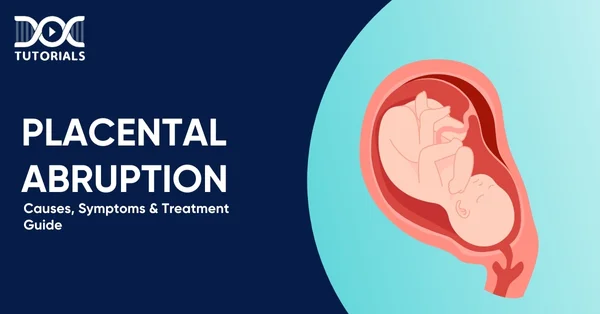Placental Abruption | Causes, Symptoms & Treatment Guide

Placental abruption is a critical condition that can happen when a woman is pregnant. It occurs when the placenta pulls away from the wall of the uterus before the baby is born. This may result in severe bleeding, which could put both the mother and baby at risk.
Thus, it is vital to detect and treat abruption of placenta early. If not taken care of in a timely manner, it might cause serious issues like preterm delivery or loss of the baby.
NEET PG students and healthcare professionals who want to improve patient care need to know the causes, symptoms, diagnoses, and available treatment options for placental abruption.
Keep reading to learn more!
What is Placental Abruption?
The placenta is an organ that connects to the uterus during pregnancy. It provides the baby with air and food, allowing it to grow. Placental abruption happens when the placenta separates from the uterus either partially or entirely before birth.
This separation can make it harder for the infant to get oxygen and nutrients. It can also make the mother experience severe bleeding. As per experts, placental abruption is most likely to happen after 20 weeks of pregnancy. It is a medical emergency that requires immediate attention.
What are the Risk Factors and Causes of Placenta Abruption?
As of now, the exact causes of placental abruption are not known. However, a number of factors can make the risk higher. Some common causes and risk factors are:
- High Blood Pressure: Chronic high blood pressure or high blood pressure during pregnancy are two of the most common causes.
- Abdominal Trauma: Getting hurt in an accident, falling, or getting hit in the belly can cause an abruption.
- Drugs and Smoking: Using cocaine or tobacco products can increase the risk.
- History of Placental Abruption: If you’ve had the ailment before, it’s more likely to come back.
- Multiple Pregnancies: Having twins or more can expand the uterus and affect the placenta.
- Premature Rupture of Membranes: If you lose amniotic fluid too soon, it can make the placental bond weaker.
- Blood-clotting Disorders: These can affect how the placenta stays attached.
Knowing these risk factors makes it easier to identify pregnancies at risk early on.
What are the Signs and Symptoms of Placental Abruption?
Placental abruption symptoms can appear suddenly. Some women experience sudden discomfort or see blood, while others may only have minor indications. Quick recognition can save lives. Some important signs to look out for are:
- Bleeding from the Vagina: Can be minor spotting or severe bleeding
- Discomfort in the Abdomen: Sharp, constant discomfort or cramps that don’t go away
- Back Pain: Pain in the lower back that doesn’t go away
- Tenderness in the Uterus: The uterus may feel firm or sore
- Rapid Contractions: Severe and frequent uterine contractions
- Less Foetal Movement: The baby might not move as much as usual
Bleeding may not be seen in some circumstances because the blood is stuck behind the placenta. This is why placental abruption should always be considered and evaluated if a pregnant woman gets sudden, inexplicable pain.
How is Abruptio Placentae Diagnosed?
The diagnosis for abruption of placenta is made via the following methods:
- During a physical exam, the doctor checks for pain and tightness in the uterus.
- Ultrasounds can determine the location of the placenta and detect any bleeding.
- Foetal monitoring keeps an eye on the baby’s movements and heart rate.
- Blood tests are performed to determine the amount of blood lost and assess the ability to clot.
Early and accurate diagnosis is key to protecting both mother and baby.
What are the Treatment Methods for Abruptio Placenta?
The treatment for placental abruption depends upon the duration of the pregnancy and the severity of the separation. In mild circumstances, monitoring may be enough, but in extreme cases, an emergency delivery is needed.
For Moderate or Early Cases:
- Observation at the Hospital: Monitoring the mother’s health and the baby’s heart rate.
- Bed Rest: To reduce stress and avoid further separation.
- Drugs: Steroids may be administered to help the baby’s lungs develop.
For Moderate to Severe Cases:
- Immediate Delivery: If the mother or baby is in danger, labour may be induced or a C-section may be performed.
- Blood Transfusions: This may be necessary if the mother has lost a lot of blood.
- IV Fluids and Oxygen: To maintain the mother’s stability and support the baby.
Every case of placental abruption is different. The medical team will determine the best course of action based on the mother’s and baby’s stability.
FAQs About Abruption Placenta
- Can a baby live through a placental abruption?
Yes, a baby can survive a placental abruption, especially if it is detected early. The baby’s chances of survival depend significantly on how far along they are and the severity of the abruption. In serious circumstances, complications or even foetal death may occur. Prompt treatment and close monitoring yield better results.
- Can placental abruption happen again in future pregnancies?
Yes, if you have one placental abruption, you are more likely to experience another one in the future. After one case, the chance is roughly 15%, and after two cases, it could go up to 25%. Tell your doctor if you have ever had a placental abruption.
- Can smoking cause the placenta to separate?
Yes, smoking is a documented risk factor for numerous issues that might happen during pregnancy, such as placental abruption. Quitting smoking can lower the risk and make the pregnancy go better overall.
- What is the difference between placenta previa and placental abruption?
When the placental abruption occurs, the placenta comes off the wall of the uterus. Meanwhile, in placenta previa, the placenta stays connected but blocks the cervix. Both illnesses can cause bleeding, but they have different causes, levels of risk, and treatment methods.
- When should a person with placental abruption call their doctor?
Patients should call their doctor right away if they have vaginal bleeding, severe cramps, or pelvic pain during pregnancy, especially in the third trimester. These could be signs of early placental abruption and require immediate treatment.
Conclusion
Placental abruption is an uncommon but major problem that can happen during pregnancy and needs medical attention right away. Understanding the indicators and risk factors can help save lives. Many women can have healthy births if their condition is found early and treated properly. However, every situation is unique, so it’s essential for a healthcare provider to monitor both the mother and the baby closely.
It is important for NEET PG students and medical professionals to know the causes, symptoms, diagnosis, and treatment of abruption of placenta in order to provide safe care for mothers.
DocTutorials provides students with detailed study materials for NEET PG in Pharmacology, Medicine, Surgery, and numerous other key areas. With our organised curriculum and professional coaching, students can become successful doctors and have a deep understanding of the medical profession. Check out our NEET PG notes today!
Latest Blogs
-

NEET SS Exam 2024: Analysis, Key Dates, Counselling
The NEET SS 2024 exam kicked off on March 29, 2025. Over two days and two slots, candidates across 13…
-

NEET PG Registration 2025: An Essential Guide For Exam Prep
The NEET PG registration, which is conducted online, is a crucial step in the exam process. Filling out the NEET…
-

NEET PG Syllabus 2026: A Must-Have Complete Guide for Exam Success
The NEET PG Syllabus acts as one of the foundation stones for aspiring postgraduate medical students like you who are…




